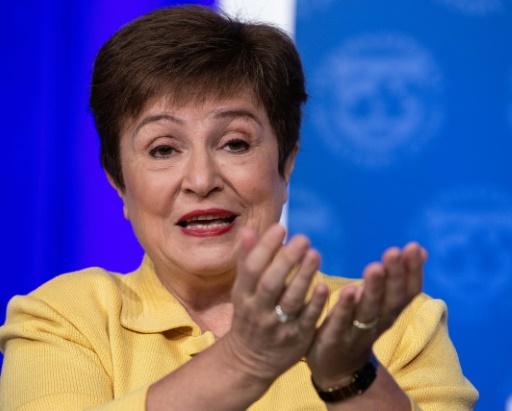The International Monetary Fund says that inflation and inequality are hindering the recovery of the global economy

This content was published on 05 Oct 2021 – 13:05
(AFP)
The Managing Director of the International Monetary Fund, Kristalina Georgieva, warned on Tuesday that the global economic recovery from the impact of Covid-19 will falter this year, against the background of high prices, high indebtedness, and a mixed recovery between rich and poor countries.
“We are facing a global recovery that continues to falter due to the pandemic and its impact. We can’t move forward properly. It’s like walking with stones in our shoes!” Georgieva confirmed, virtually participating from Washington in a forum at Bocconi University in Milan.
The head of the International Monetary Fund was originally scheduled to travel to Italy to give this speech. His spokesman, after consulting with AFP, did not specify the reason for the cancellation of the flight.
The International Monetary Fund (IMF) will reveal new growth forecasts next week, but Georgieva cautioned that after the 6% expansion forecast for 2021 projected in July, growth is now expected to slow slightly this year.
“The stones in our shoes have become more and more painful,” he said, noting “more obvious risks and obstacles,” including the growing divergence between rich and poor countries in their recovery paths after the outbreak of the pandemic.
Georgieva warned that “output in advanced economies is expected to return to pre-pandemic trends by 2022. But most emerging and developing countries will take many years to recover.”
“This belated recovery will make it difficult to avoid long-term economic scars, including job losses, which particularly affect young people, women and those working in the informal sector,” he said.
– More money –
Georgieva’s speech comes ahead of the annual meetings of the International Monetary Fund and the World Bank, where the fund will release its latest report, World Economic Prospects (WEO).
Since the last forecast update in July, the IMF’s toolkit to deal with the global pandemic crisis has expanded significantly, with a $650 billion increase in member countries’ cash reserves, known as Special Drawing Rights.
About $275 billion of these reserves went to emerging and developing countries, and Georgieva called on countries that did not need it to direct it to the agency’s anti-poverty programs.
In her speech on Tuesday, the head of the International Monetary Fund stressed that the global recovery is at risk of derailing.
He said the United States and China, the world’s two largest powers, continue to drive growth. And some advanced economies, including those in Europe, continue to gain strength.
“In contrast, in many other countries, growth continues to deteriorate, hampered by poor access to vaccines and limited policy response, especially in some low-income countries,” Georgieva explained, adding that this phenomenon “has become more persistent.”
– debt equal to GDP –
One of the reasons for this economic behavior is inflation, which has risen all over the world.
Georgieva said food prices rose 30 percent last year, and energy prices also rose.
The fund said the fund expects gains to taper off next year, but they will continue in emerging and developing economies.
In addition, global public debt has reached nearly 100% of GDP, according to the Managing Director of the International Monetary Fund.
– Vulnerabilities and vaccines –
Closing the gaps will require measures that include increasing the availability of the covid-19 vaccine, but Georgieva said a “bigger push” is needed to meet the IMF and World Bank’s maximum target of 40% worldwide vaccination. by the end of this year and 70% by the end of 2022.
He also called on countries to seize the opportunity to pursue economic reforms aimed at reducing carbon emissions, developing digital infrastructure, and setting a global minimum tax to reduce corporate taxes abroad.
The managing director of the International Monetary Fund, who has been in office since 2019, spoke after an independent investigation in September said she had tampered with data for China while she was the World Bank’s CEO.
According to law firm WilmerHale, Georgieva was among senior World Bank officials who lobbied staff to change data in favor of China in the 2018 edition of Doing Business, the institution’s flagship report.
Georgieva called the conclusions of the Wilmerhill report “misleading” and said she had not pressured “anyone”.

“Award-winning zombie scholar. Music practitioner. Food expert. Troublemaker.”









